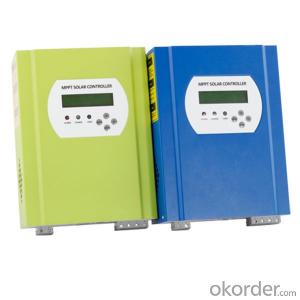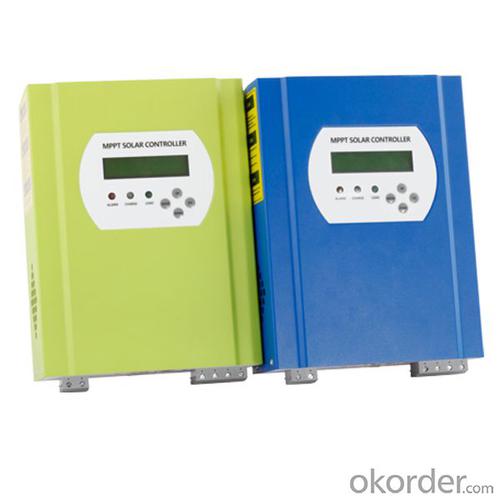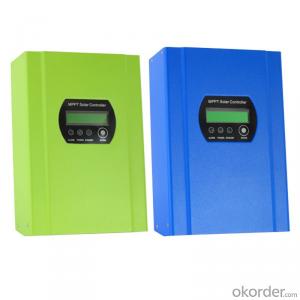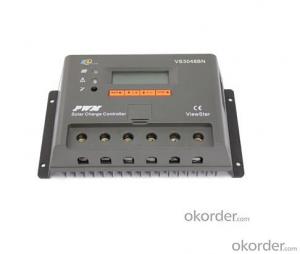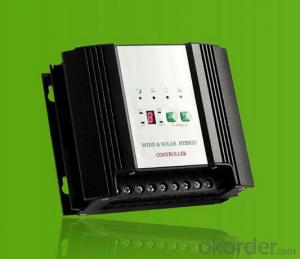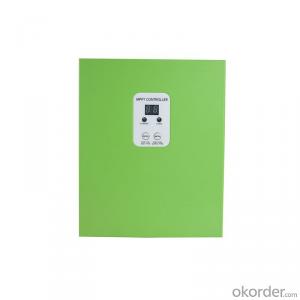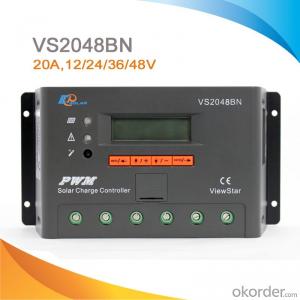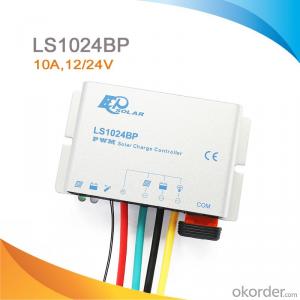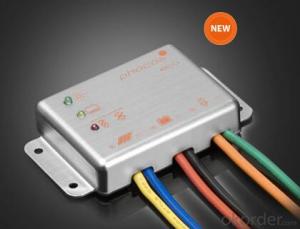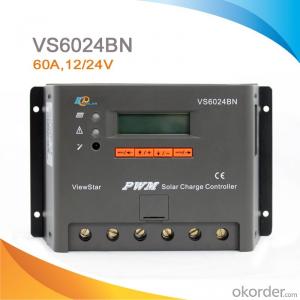Marine Solar Charge Controllers Smart2 30A Solar MPPT Battery Charger Controller DC 12V/24V/48V
- Loading Port:
- China main port
- Payment Terms:
- TT OR LC
- Min Order Qty:
- 20 unit
- Supply Capability:
- 9999 unit/month
OKorder Service Pledge
OKorder Financial Service
You Might Also Like
Smart2 30A Solar MPPT Battery Charger Controller
More Pictures
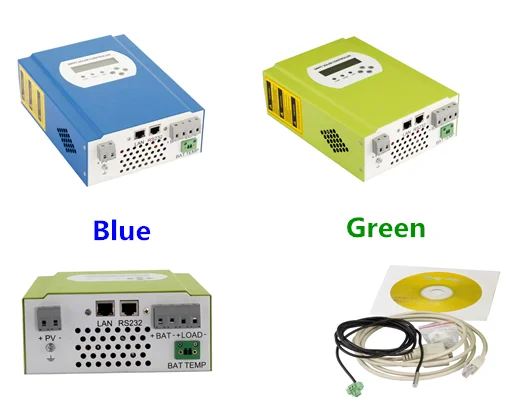
LAN/RS232 connecting
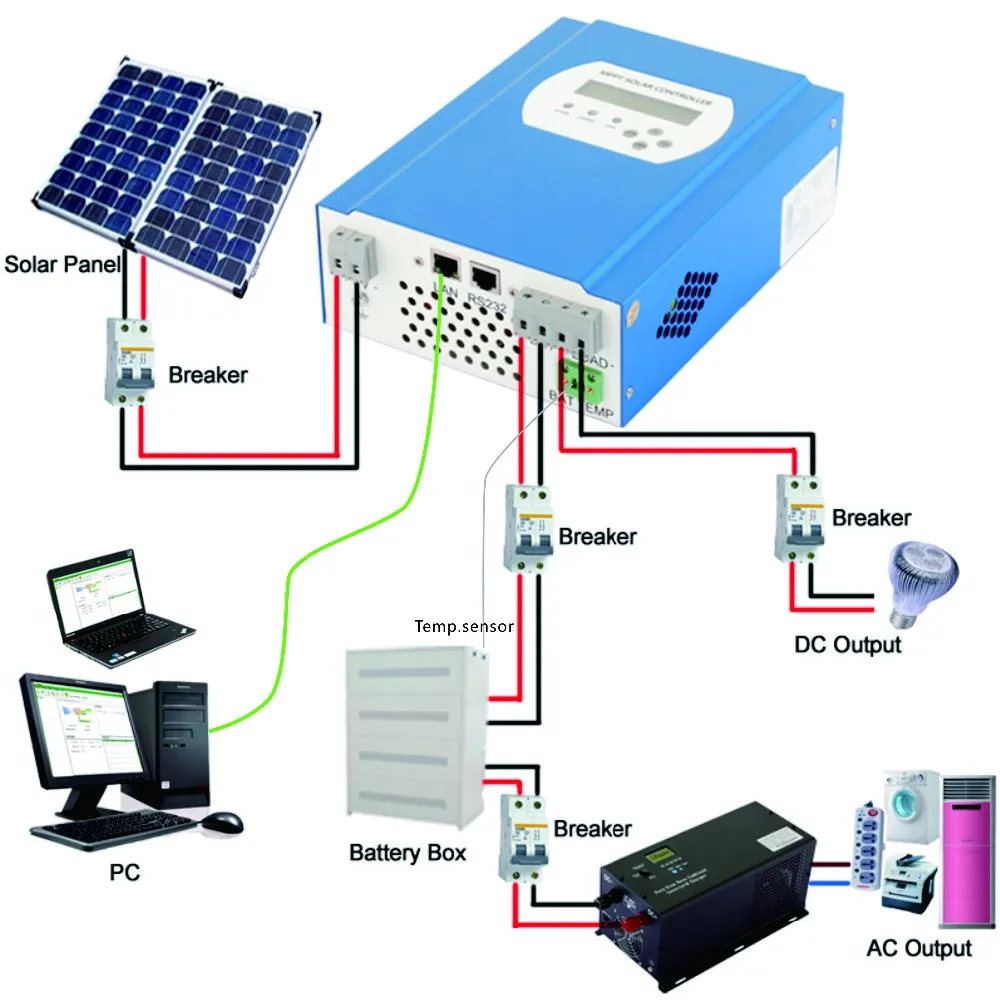
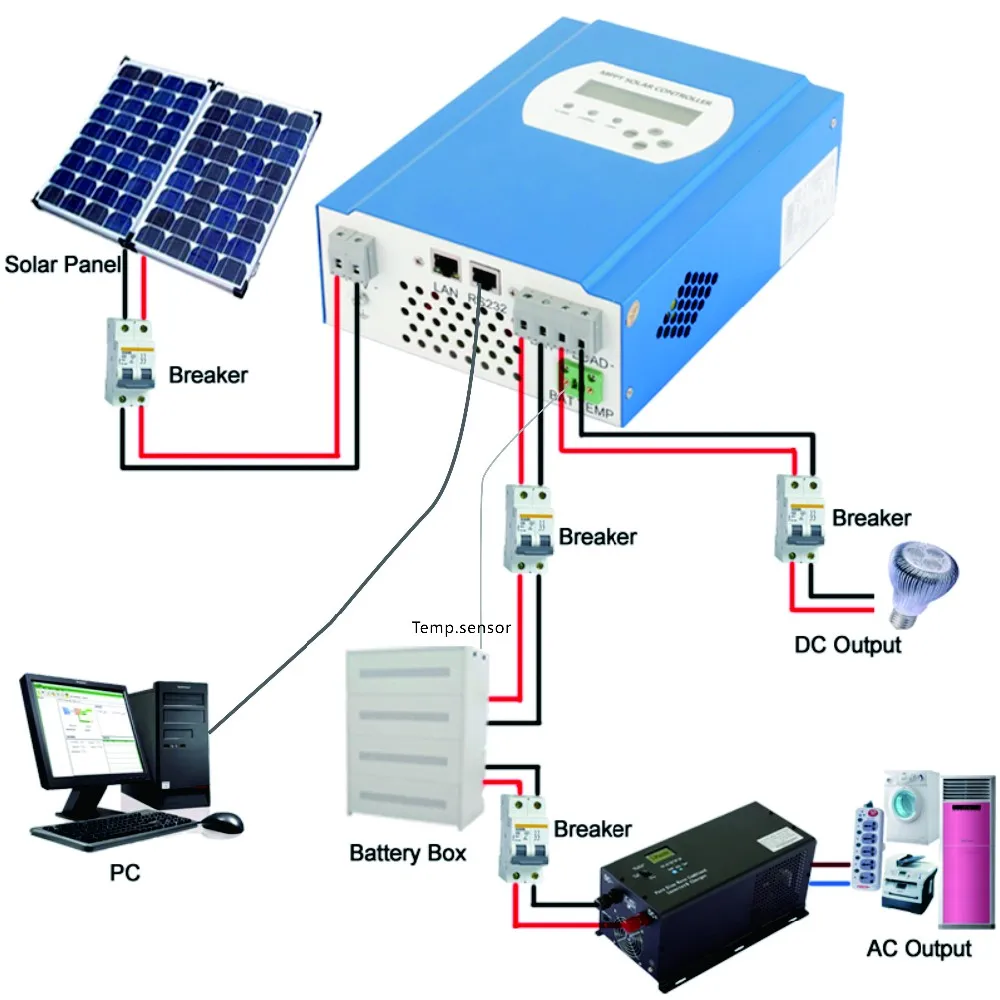
Upper PC software (real time monitor)
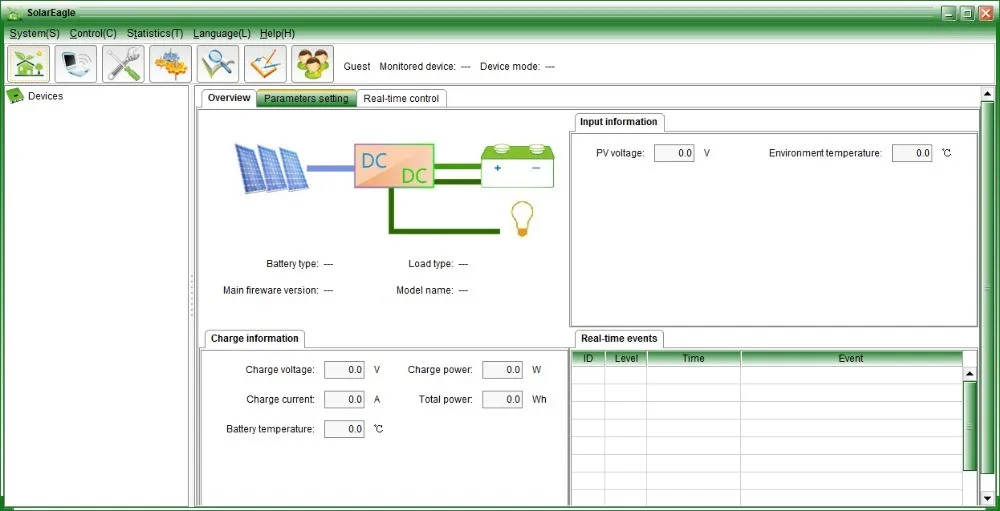
Application
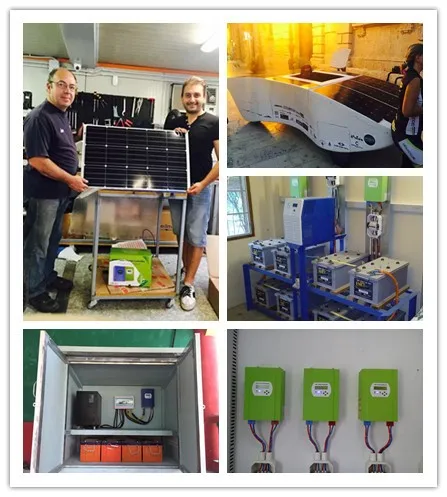
Feature
1. MPPT charging mode, conversion efficiency upto 99%
2. Maximum PV input voltage up to DC150V
3. RS232 and LAN communication port
4.Discharge mode: ON/OFF mode, double time control mode, PV voltage control mode, PV voltage+time delay mode.
5.LCD and LED show various parameters
6. Controllers can be connected in unlimited parallels
7. CE,RoHS, FCC certification approved
8. 2 years warranty, lifelong free technical service.
Parameter
| Model:I-P-SMART2-20A/25A/30A -series | 20A | 25A | 30A | ||
| Charge Mode | Maximum Power Point Tracking | ||||
| Method | 3 stages: fast charge(MPPT),constant voltage, floating charge | ||||
| System Type | DC12V/24V/48V | Automatic recognition | |||
| PV Modules Utilization Rate | 12V/24V/48Vsystem | ≥99% | |||
| Input Characteristics | |||||
| MPPT Working Voltage and Range | 12V system | DC18V~DC150V | |||
| 24V system | DC34~DC150V | ||||
| 48V system | DC65~DC150V | ||||
| Input Overvoltage Protection Point | 12V/24V/48V system | DC150V | |||
| Max. PV Power | 12V system | 286W | 357W | 429W | |
| 24V system | 572W | 715W | 858W | ||
| 48V system | 1144W | 1430W | 1716W | ||
| Output Characteristics | |||||
| Selectable Battery Types | 12V/24V/48Vsystem | Sealed lead acid, vented, Gel, NiCd battery | |||
| (Default type is GEL battery) | (Other types of the batteries also can be defined) | ||||
| Rated Output Current | 12V/24V/48V system | 20A | 25A | 30A | |
| Physical | |||||
| Pc (communication port) | RS232 or LAN | ||||
| Measurement D*W*H(mm) | 220*165*70mm | ||||
| N.G(kg) | 2kg | ||||
| Color | Blue/Green/OEM (optional) | ||||
| Safety | CE, RoHS,FCC | ||||
Certifications |
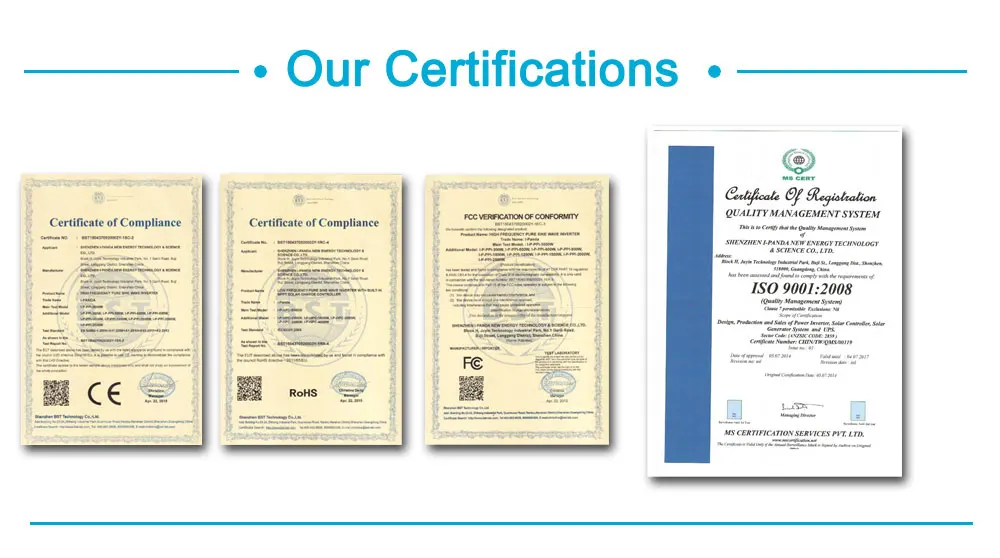
F&Q: |
Q1. How to ensure and monitor the products quality?
A1: We have established a perfect Quality Management System, In strict
accordance with ISO9001: 2008 quality system and ISO14001 environment system for quality assurance management;
Our ISO9001:2008 Quality System certificate encoding: CHIN/TW/QMS/00119;
Our ISO14001 Environment System certificate encoding: CHIN/TW/EMS/00028;
Q2. What is the warranty of products?
A2: The warranty period of different products are different; 5 years, 3 years, 2 years, 1 years; More details please refer to the product specification or manual; we will provide free life-long technical support ;
Q3. What is the difference between MPPT&PWM?
A3. MPPT charging mode, peak efficiency up to 99%, saving 30%~60% solar panel than traditional PWM controller.
- Q: How do I determine the maximum solar panel input current for a solar controller?
- In order to determine the maximum solar panel input current for a solar controller, several factors must be considered and calculations need to be performed. The following steps outline the process: 1. Begin by checking the specifications of your solar controller. The manufacturer typically provides product specifications that include the maximum solar panel input current. Look for the "Max Input Current" or "Max PV Current" rating. This value represents the highest current that the solar controller can handle. 2. Next, determine the maximum current rating of your solar panels. This information is usually available in the specifications or datasheet of the panels. Look for the "Imp" (maximum power current) or "Isc" (short-circuit current) rating. This value represents the maximum current that the solar panels can generate under optimal conditions. 3. Take into account the total number of solar panels in your system. If you have multiple panels connected in series or parallel, you must consider the combined current they generate. In series connections, the current remains the same, while in parallel connections, the currents add up. 4. Check the voltage compatibility. Make sure that the voltage output of your solar panels aligns with the voltage input range of your solar controller. If the voltages do not match, you may need to use a voltage converter or select a different solar controller. 5. Perform the necessary calculations. Multiply the maximum current rating of a single solar panel (Imp or Isc) by the number of panels in the system. If you have parallel connections, add up the currents. For series connections, the current remains the same. 6. Compare the calculated current with the maximum input current rating of the solar controller. If the calculated current is lower than or equal to the maximum input current rating of the solar controller, it is compatible. However, if the calculated current exceeds the maximum input current rating, you will need to either reduce the number of panels or choose a different solar controller with a higher input current rating. Always refer to the product manuals, datasheets, or contact the manufacturer for accurate and specific information regarding your solar panels and solar controller.
- Q: How do I calculate the maximum power handling capacity for a solar controller?
- To calculate the maximum power handling capacity for a solar controller, you need to consider a few key factors. First, you should check the specifications of the solar controller to see if it provides a maximum power handling capacity rating. This rating is usually mentioned in terms of watts (W) or amperes (A). If it is provided, you can simply use that value as the maximum power handling capacity. If the rating is not mentioned, you can calculate the maximum power handling capacity by using the formula P = V * I, where P is power in watts, V is voltage in volts, and I is current in amperes. To find the maximum current rating, you can refer to the solar panel's specifications and note the maximum current output. Keep in mind that the solar panel's maximum current output may vary depending on factors like temperature and sunlight intensity. Next, you need to determine the voltage at which the solar controller operates. This information can be found in the specifications of the solar controller. Once you have both the maximum current and voltage values, multiply them together to calculate the maximum power handling capacity. For example, if the solar panel's maximum current output is 5A and the solar controller's operating voltage is 12V, the maximum power handling capacity would be 5A * 12V = 60W. It is recommended to choose a solar controller with a power handling capacity slightly higher than the maximum power output of your solar panels. This allows for some headroom and ensures that the solar controller can handle the peak power generated by the panels without overloading or damaging the system.
- Q: How does a solar controller handle the display of system information?
- A solar controller handles the display of system information by collecting and processing data from various sensors and components of the solar system. It then uses this information to provide real-time updates on the system's performance, including battery status, charging/discharging rates, voltage, and current levels. This data is typically displayed on a digital screen or LED indicator, allowing users to monitor and optimize the efficiency of their solar system.
- Q: Can a solar controller be used with a solar inverter?
- Yes, a solar controller can be used with a solar inverter. A solar controller is responsible for regulating and managing the charge from the solar panels to the batteries, while a solar inverter converts the DC power produced by the solar panels into AC power that can be used to power household appliances. Both devices work together in a solar power system to ensure efficient energy production and usage.
- Q: What is the purpose of a solar controller in a solar power system?
- The purpose of a solar controller in a solar power system is to regulate and control the flow of electricity between the solar panels and the batteries. It ensures that the batteries are charged efficiently and prevents overcharging, over-discharging, and damage to the batteries. Additionally, the solar controller helps in maximizing the overall performance and lifespan of the solar power system.
- Q: How long is the lifespan of a typical solar controller?
- The lifespan of a typical solar controller can vary depending on several factors. On average, a well-maintained and high-quality solar controller can last anywhere from 10 to 15 years. However, there are instances where solar controllers have been known to last even longer, nearing 20 years or more. The longevity of a solar controller can be influenced by factors such as the brand and quality of the controller, the operating conditions it is subjected to, and the level of maintenance and care provided. Higher quality controllers from reputable brands tend to have better build quality and durability, resulting in a longer lifespan. The operating conditions also play a vital role in determining the lifespan of a solar controller. Extreme temperatures, humidity, and exposure to harsh weather conditions can impact the longevity of the controller. Controllers installed in regions with more moderate climates and protected locations generally tend to last longer. Proper maintenance and care can significantly extend the lifespan of a solar controller. Regularly inspecting and cleaning the controller, ensuring proper ventilation, and protecting it from excessive moisture or dust can help prolong its life. It is also essential to follow the manufacturer's guidelines for maintenance and avoid overloading the controller beyond its rated capacity. Ultimately, while the average lifespan of a solar controller is around 10 to 15 years, several factors can influence its longevity. By investing in a high-quality controller, providing suitable operating conditions, and practicing regular maintenance, it is possible to extend the lifespan and maximize the efficiency of a solar controller.
- Q: How does a solar controller prevent short circuits?
- A solar controller prevents short circuits by continuously monitoring the flow of electricity from the solar panels to the battery. It incorporates various protective mechanisms such as fuses, circuit breakers, and built-in voltage regulators to ensure that excessive current or voltage spikes are detected and prevented from causing damage. Additionally, it incorporates proper insulation and wiring to minimize the risk of short circuits.
- Q: How does a solar controller handle variations in ambient light conditions?
- A solar controller handles variations in ambient light conditions by continuously monitoring the incoming solar energy and adjusting the charging parameters accordingly. It uses sensors to measure the intensity of light and adjusts the charging current and voltage to optimize the charging efficiency and protect the battery from overcharging or undercharging.
- Q: What is the maximum charging time that a solar controller can provide?
- The solar controller's ability to charge the battery for a maximum period of time is heavily reliant on the solar panels' capacity and efficiency, as well as the battery being charged. Solar controllers, also referred to as charge controllers, regulate the flow of charge from the solar panels into the battery. Under ideal circumstances, where there is an abundance of sunlight and the solar panels are operating at their optimum efficiency, the solar controller can continue charging the battery until it reaches its maximum capacity. However, this can vary depending on factors such as the battery's size and type, the availability of sunlight, and any additional power requirements or loads. It is important to emphasize that the primary function of solar controllers is to prevent overcharging and harm to the battery. Once the battery has reached its maximum charge, the solar controller will cease charging or redirect any excess energy to another load, such as powering devices or feeding it back into the grid. Ultimately, the maximum charging time of a solar controller is determined by the specific components of the system and the surrounding environmental conditions. It is advisable to consult the manufacturer's specifications and guidelines for the solar controller and battery being utilized in order to ascertain the maximum charging time.
- Q: Can a solar controller be used with a solar-powered security system?
- Yes, a solar controller can be used with a solar-powered security system. A solar controller regulates and optimizes the flow of power from the solar panels to the batteries, ensuring efficient charging and preventing overcharging. This is crucial for maintaining a reliable power supply to the security system, especially in remote locations where grid power may not be available.
Send your message to us
Marine Solar Charge Controllers Smart2 30A Solar MPPT Battery Charger Controller DC 12V/24V/48V
- Loading Port:
- China main port
- Payment Terms:
- TT OR LC
- Min Order Qty:
- 20 unit
- Supply Capability:
- 9999 unit/month
OKorder Service Pledge
OKorder Financial Service
Similar products
Hot products
Hot Searches
Related keywords
